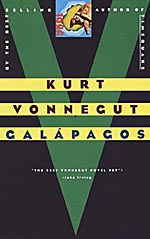
![]() Scott Laz
Scott Laz
7/11/2013
![]()
"So I raise this question, although there is nobody around to answer it: Can it be doubted that three-kilogram brains were once nearly fatal defects in the evolution of the human race? A second query: What source was there back then, save for our overelaborate nervous circuitry, for the evils we were seeing or hearing about simply everywhere? My answer: There was no other source. This was a very innocent planet, except for those great big brains." – Leon Trout, a million years hence.
Homo sapiens is clearly an evolutionary dead-end, so it's time for natural selection to take the next step. The next step in human evolution is a common SF theme, especially prevalent in the '50s—think More Than Human and Childhood's End. More recently, we have gotten stories about posthuman futures, in which humanity creates its own evolutionary changes (unnatural selection?) by way of genetic manipulation or cybernetics. In his typical Mark Twain-like fashion, Kurt Vonnegut takes these more optimistic possibilities for humanity's future and turns them upside down. After all, the reason humanity is unsustainable is not because we haven't developed far enough; rather, it's because of tendencies associated with our "big brains." As a result, nature will throw an infertility virus at us, and the few remaining survivors, marooned on the Galapagos island of San Rosario and thus isolated from the spread of the virus, will evolve into creatures with smaller, more practical brains, content to spend life swimming (arms having evolved into fins) in search of fish to eat, sleek and content—existing harmoniously with nature rather than attempting to dominate it, population explosions prevented by great white sharks and killer whales.
We learn the history of the next million years from narrator Leon Trotsky Trout, son of hack science fiction writer Kilgore Trout, already familiar to readers of Vonnegut's work (and who makes a brief appearance, despite being dead). He tells the story of the small band of people destined to repopulate Earth, and we learn Leon's story as well. Deserted by his mother and ashamed of his father, Leon ran away at sixteen, and fought in Vietnam, participating in a massacre of civilians—the sort of absurdly destructive action that haunts Vonnegut and feeds his bitter satires. He deserts the army and finds political asylum in Sweden. Working in a shipyard, Leon is accidentally decapitated by a panel of sheet metal while working on the Bahia de Darwin, the boat destined to ferry the last specimens of humanity to Santa Rosario. Refusing to enter the long blue tunnel to the afterlife, Leon haunts the ship, observing and reporting the story that becomes the novel, which he doesn't write until a million years later, thus providing the story's unique perspective. We know right from the start that humanity is going to be wiped out, and that natural selection will eventually rid humanity of the big brains that caused all their problems, but there is still an odd sort of suspense as Vonnegut fills in the details of the story, jumping around in time while still keeping the main story's momentum going.
Beginning with a financial crisis ("a sudden revision of human opinions as to the value of money and stocks and bonds and mortgages and so on") that scuppers Ecuador's hopes of jumpstarting its economy by way of Galapagos Islands tourism (the Bahia de Darwin was built to host "the Nature Cruise of the Century"), Galapagos describes the circumstances by which an odd group of tourists end up on Santa Rosario and perpetuate the human race, otherwise killed off by a virus (possibly inspired by AIDS, which was just becoming well-known at the time of the novel's writing). A widowed high school teacher, a con man who preys on wealthy widows, a pregnant Japanese flower arranger, the blind daughter of a wealthy sponsor of the cruise company, the ship's captain, and a small group of native Ecuadorian girls: these are the people who will survive to continue the species, beginning with the fur-covered offspring of the granddaughter of a Hiroshima survivor.
Told in short chapters, jumping around in time, stuffed with quotations and Leon's (presumably standing in for Vonnegut's) darkly humorous philosophical observations, Galapagos is a quintessential Vonnegut novel, ranking not far below the '60s classics Cat's Cradle and Slaughterhouse Five, but incorporating the concerns of the '80s—financial crisis, environmental disaster, Latin American political instability—"the latest in a series of murderous twentieth century catastrophes which had originated entirely in human brains." For those willing to go along with Vonnegut as he stares in the face of human absurdity and futility, Galapagos fascinating, funny, and moving.
"A million years later, I feel like apologizing for the human race. That's all I can say." – Leon Trout